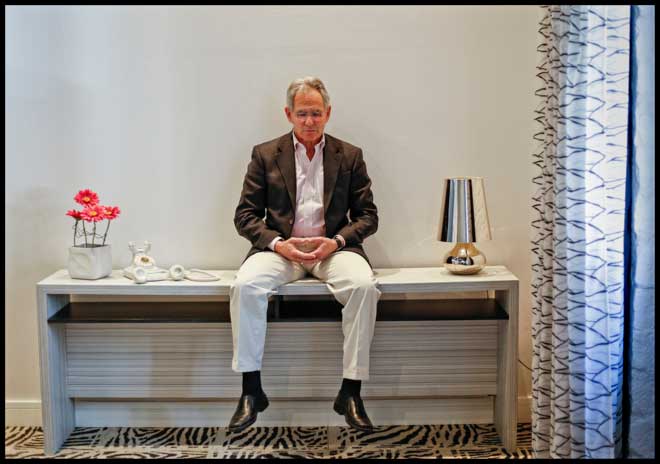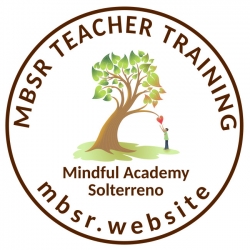Mindfulness-Based Stress Reduction (MBSR) is an eight-week evidence-based program that offers secular, intensive mindfulness training.
It is designed to help participants develop their own mindfulness practice and learn new ways of handling difficult physical sensations, feelings and moods. It was developed by Jon Kabat-Zinn and his colleagues at the University of Massachusetts Medical Centre in 1979 and it is now taught all over the world. It is particularly helpful for people suffering from stress, anxiety, depression and pain.

Forty years ago Jon Kabat-Zinn began the MBSR Mindfulness programme. His hypothesis was simple – the practice of mindfulness could help alleviate the pain and suffering associated with chronic disease. Now, 40 years later, we know unequivocally that mindfulness can not only reduce pain and suffering but can also be used as an adjunct to standard medical care for a multitude of diseases and as a preventive measure to reduce the incidence of stress-related illness. The progress that has been made these last 40 years in our understanding of the power of mindfulness has been nothing short of remarkable.
Mindfulness: what is it?
We are living in hectic times – but we can make a choice to care for ourselves, to enhance our well-being and resiliency in order to be more peaceful and effective in our daily lives. Mindfulness is one of the most efficacious evidence-based solutions to address stress. Mindfulness is the capacity to be attentive to the present moment experience with friendliness.
The 1st component pertains to the ability to discern and identify clearly what is happening in each moment.
One learns to regulate attention by sustaining one’s observation of physical sensations, emotions and thoughts and intentionally reduce, for instance, unhelpful thinking habits such as rumination.
The 2nd component of Mindfulness involves maintaining an attitude of friendliness.
Rather than judging, ignoring, or minimizing our sensations, thoughts and emotions, Mindfulness brings openness, nonreactivity and nonjudgment to these experiences.
Adapted from Mildred V. Barthel
“Happiness is a choice,
not an automatic response.
You cannot choose what happens,
but with Mindfulness you can
choose how to respond.”
Adapted from Mildred V. Barthel
Mindfulness-Based Stress Reduction (MBSR)
Background
MBSR is based on a rigorous and systematic training in mindfulness. This 8-week stress reduction program follows an evidence–based protocol. It was developed in the late 70’s at the University of Massachusetts Medical Center in the US and has since assisted thousands of people all over the world to manage stress in their lives and to care for themselves. Since then, considerable scientific research has demonstrated the efficacy of the program in a variety of contexts.
The benefits that were demonstrated are varied:
- improved social skills including more empathic relationships with family, friends and colleagues;
- increased ability to feel in control, to be calm and resilient;
- better physical health;
- reduced stress and anxiety;
- improved sleep.

Historical development in 21st Century
In 1979 Dr. Jon Kabat-Zinn founded the Mindfulness-Based Stress Reduction program at the University of Massachusetts to treat the chronically ill, which sparked a growing interest and application of mindfulness ideas and practices in the medical world for the treatment of a variety of conditions in people both healthy and unhealthy. The Mindfulness-Based Stress Reduction program uses the body scan as well as sitting meditation to manage pain. The body scan is derived from a traditional Burmese meditation practice called sweeping, from the school of U Ba Khin that S. N. Goenka teaches in his ten-day Vipassana retreats.
Much of this was inspired by teachings from the East, and particularly from the Buddhist traditions, where mindfulness is one of the eight constituents of the Noble Eightfold Path taught by Siddhartha Gautama, The Buddha, who founded Buddhism almost 2,500 years ago. Although originally articulated as a part of what is known in the West as Buddhism, there is nothing inherently religious about mindfulness, and it is often taught independent of religious or cultural connotation.
Thich Nhat Hanh has brought mindfulness to the attention of Westerners. It was on a retreat he led in the United States that an American doctor, Jon Kabat-Zinn, first realized the appropriateness of mindfulness in the treatment of chronic medical conditions. Kabat-Zinn later adapted Hanh’s teachings on mindfulness into the structured eight-week Mindfulness Based Stress Reduction course, which has since spread throughout the western World.
Mindfulness and other Buddhist meditation techniques receive support in the West
from figures such as the scientist Jon Kabat-Zinn, the teacher Jack Kornfield, the teacher Joseph Goldstein, the psychologist Tara Brach, the writer Alan Clements, and the teacher Sharon Salzberg, who have been widely attributed with playing a significant role in integrating the healing aspects of Buddhist meditation practices with the concept of psychological awareness and healing. Psychotherapists have adapted and
developed mindfulness techniques into a promising cognitive behavioural therapies vis.
MBSR Mindfulness-based Courses
The aim of mindfulness-based MBSR 8 Week course is to systematically develop, week by week, the skill of being present with internal experience (body sensation, thoughts/feels and emotions) and with external experience (interactions with others, actions in the world) and the interplay between these two.
The core characteristics of the course are:
?Course structure:
- An individual pre-course session to meet the participant and agree if the course is right for them at this moment in their lives.
- Eight weekly sessions of usually 2.5 – 3 hours duration.
- A day-long guided and structured silent day of mindfulness practice.
?Course content:
- Instruction is formal mindfulness meditation methods
- Body-scan meditation
- Mindful Movement
- Sitting meditation
- 3 Step Breathing Space both regular difficult and coping versions
- Instruction in developing an informal mindfulness meditation practice in everyday life
- Daily home practices of formal practice (30-45 minutes per day) and informal practices for the duration of the course
- Discussions between the teacher and group participants within the course sessions
- Discussions and sharing of areas highlighted which link the practices to daily life and life challenge
?What are we helping people to “GET” in an 8 week course?
- Exploring new possibilities.
- Discovering embodiment.
- Cultivating observation.
- Moving to acceptance.
- Growing compassion.
Benefits of Meditation
Health benefits of mindfulness are caused, in part, by four interrelated factors:
Attention regulation is the ability to maintain awareness on an object of meditation, like the breath. It is trained, in part, by gently and repeatedly bringing attention back to the object of meditation when distracted. Sustained attention can help develop positive emotions.
Body awareness is the ability to monitor the body’s sensations, and is thought to foster emotional awareness and regulation, and empathic response. It can be achieved by applying mindfulness to the body, perhaps with a “body scan,”
Change in perspective on the self is the ability to alter self-perception. The belief that the self is permanent and unchanging is thought to be the core cause of much psychological distress. Mindfulness is thought to increase one’s ability to see the self as impermanent and changing and lead to enduring forms of happiness.
Emotion regulation is the ability to adjust emotional responses through a variety of techniques and strategies. Those who practice mindfulness are instructed to expose themselves to emotions, feeling and not reacting to the emotional experience, regardless of whether or not it is pleasant or unpleasant. Said more simply, emotions and their related bodily responses are to be accepted. This kind of emotional exposure facilitates well-being and the arising and passing of emotions.
